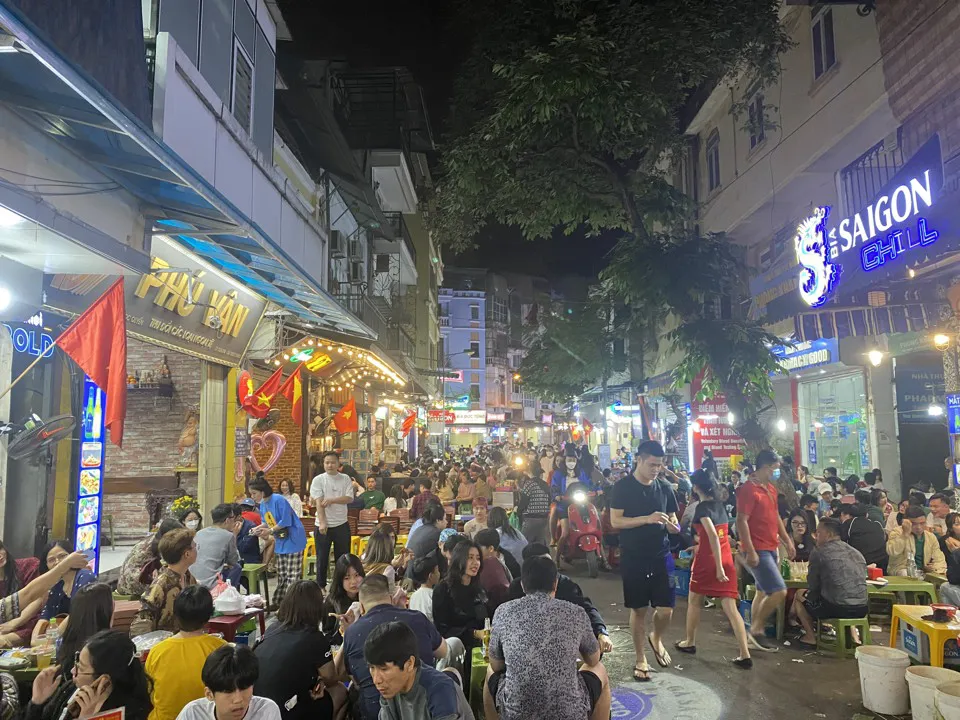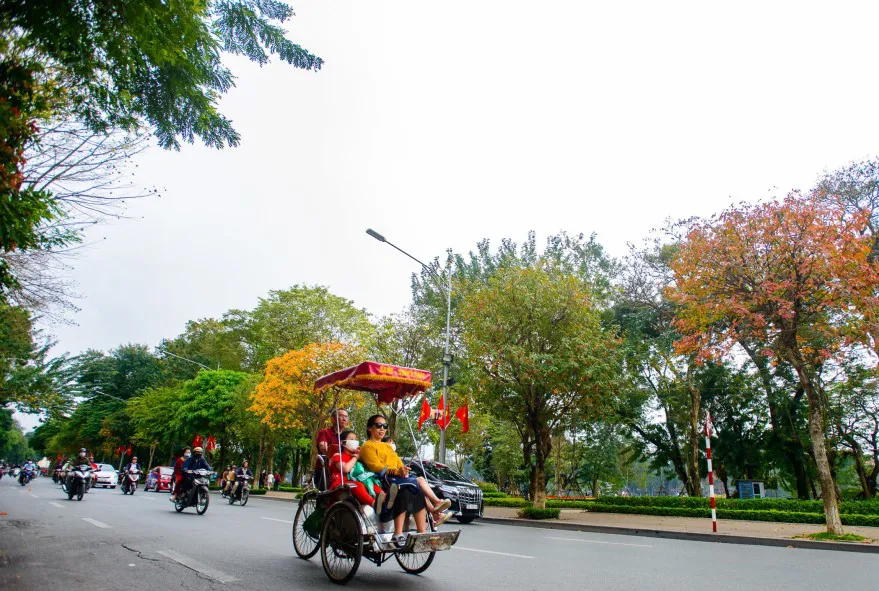Vietnam strengthens tourism workforce training
The success of a hotel business depends on customer-oriented, hard-working employees with the right skills.
Vietnam's tourism and hospitality industry is recovering strongly after the Covid-19 pandemic, and the country has promoted quality human resources as a key to maintaining this momentum.
The Vietnam National Authority of Tourism reported that in 2023, the tourism sector in the nation served 108 million domestic and 12.5 million foreign visitors.
Improving the quality of human resources would help sustain this momentum, according to Ngo Thi Quynh Xuan, Director of the Saigon Tourism College. "Hospitality workers with international standards will better meet the expectations of employers and the job requirements of tourism service providers," he said.
Crowds of tourists on Ta Hien Street in downtown Hanoi. Photo: Duy Khanh/The Hanoi Times |
"The support from Switzerland, with its rich experience in tourism training, will help Vietnam's tourism human resources to reach higher international standards and thus meet the needs of domestic and foreign labor markets," the director said at a seminar on "Sustainable Development of Human Resources for Vietnam Tourism: Opportunities and Challenges" held in Hanoi on September 10.
In the framework of the seminar, Helvetas Swiss Inter-cooperation, a Swiss association for international cooperation, in collaboration with Vietnam's Centre for Rural Economy Development, launched the Swiss Executive Hospitality Training Program as part of the Swiss Tourism for Sustainable Development in Vietnam (ST4SD) project.
The program aims to develop Vietnam's tourism industry and quality human resources more sustainably and comprehensively.
The training courses, programs, and conditions will be developed in close cooperation between Vietnamese training institutions and the EHL Hospitality Business School of Switzerland. During the pilot period from 2023-2027, the project will be implemented in four training institutions in Hanoi, Danang, and Ho Chi Minh City.
Drawing on his experience in tourism development in Switzerland and the cooperation process in implementing the Swiss Tourism for Sustainable Development project in Vietnam, Swiss Ambassador to Vietnam Thomas Gass said that sustainability is a particularly important factor in the tourism industry, where human resources are crucial.
"The Covid-19 crisis has shown us how important human resources are in the tourism industry. This is a necessary time to strengthen cooperation and invest in tourism and hotel management to ensure that Vietnam's tourism industry not only meets current needs but is also well prepared for future challenges and opportunities," he said.
"People want to come to Vietnam not only to visit and take pictures but also to enjoy professional and impressive services. When we travel, do we want to be greeted by a robot, even though the development of artificial intelligence can help us quickly achieve what we want? When we travel, we all want emotional experiences, we see the need for long-term investment in training human resources to meet high standards," Ambassador Thomas Gass emphasized.
Nguyen Anh Tuan, Director of the Institute for Tourism Development, told The Hanoi Times that working in hotels is characterized by long hours, low pay, instability, and low status, making it an unattractive career choice. As a result, the sector continues to suffer from high staff turnover and difficulties in recruiting qualified staff.
Tourists on a cyclo tour of the Hoan Kiem Lake area of Hanoi. Photo: Khanh Huy/The Hanoi Times |
He said it is important to ensure a better work-life balance for employees, and companies should have favorable policies to recruit workers.
"Retention of key employees is critical to the long-term success of any business. Successful hotel operations are sustained by customer-oriented and hardworking employees with appropriate skills," Tuan said.
He added that it was important to focus on vocational training in tourism. "We should improve the quality of students graduating from vocational institutions. We should also make policies more flexible to allow students to learn higher skills and switch to other fields, especially foreign languages."
Hotels should work closely with training institutions to recruit long-term or short-term workers for their operations.
Pham Hong Long, Dean of the Faculty of Tourism at the University of Social Sciences and Humanities under Vietnam National University-Hanoi, said that to sustain tourism growth, Vietnam needs to address both short-term and long-term challenges in developing qualified human resources.
To improve the quality of human resources in the industry, he recommended that training centers move toward training that is closely related to job requirements and more practice-oriented. "The ultimate goal is to meet tourists' expectations in terms of facilities and services according to international standards," Long told The Hanoi Times.
Because Hanoi views tourism as a highly specialized sector that requires highly skilled workers, the city's tourism workforce must be proficient in foreign languages, computer technology, and communication. Recognizing the importance of human resources, Hanoi has held training courses for the tourism industry's workforce, linking training institutions and tourism enterprises to put training into practice. It's considered a key factor in improving the quality and competitiveness of the industry. More than 72,000 people are directly employed in the tourism industry (including those working in cultural, artistic, physical education and sports institutions, non-business entities, and companies), while the indirect human resources are estimated at 150,000. Many new forms of tourism have emerged, such as community tourism, night-time excursions, and sports tourism. This development also places qualitative and quantitative demands on human resources in Hanoi's tourism, requiring all stakeholders' involvement, including regulators, educational institutions, businesses, professionals, and employees. The tourism sector in Hanoi is currently planning more training programs on driving, community tourism services, accommodation management, and others. The Hanoi Department of Tourism has adopted many solutions to attract quality human resources and motivate them through activities to be enthusiastic and stay in the profession for a long time. The measures include promoting international cooperation with foreign educational organizations, mobilizing resources to develop a quality workforce for Hanoi's tourism industry, and most importantly, strengthening the government-school-employer (business) link, in which the city government encourages cooperation between tourism educational institutions and businesses. Only then will the capital's tourism industry gradually strengthen its human resources and meet the growing needs of developing new trends. |












